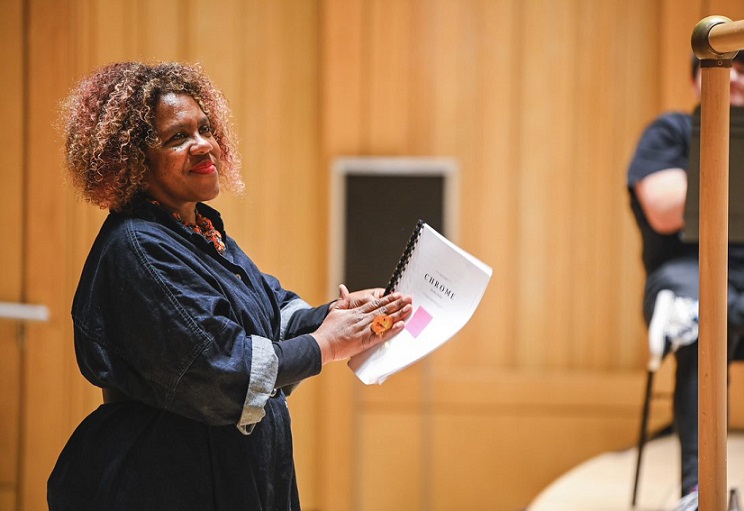
Image Copyright: Kirsten McTernan

The Royal Welsh College of Music & Drama recently reiterated the educational values that have underpinned a redesign of the outlook of its various undergraduate programmes.
Collaborations which focus on artistry and society, inspiring students to a greater understanding of diversity, inclusion and excellence have brought critical acclaim as well as exciting opportunities to reach out to a wider listening audience for its concert programmes.
This was shown with the recent visit of composer and RWCMD Fellow, Errollyn Wallen, who worked on her compositions with both the college orchestra and brass band.
Lucid understanding
‘Chrome’ was originally written in 1997 for the National Youth Brass Band of Great Britain and provided the concert centrepiece led by Dr Robert Childs – its sophisticated musical language played with lucid understanding.
Vividly coloured and textured over its ostinato foundation, it drew the listening into its complexities and nuanced wit, the MD allowing the lines to intermingle with clarity.
Vividly coloured and textured over its ostinato foundation, it drew the listening into its complexities and nuanced wit, the MD allowing the lines to intermingle with clarity.
Clear understanding was also displayed with ‘All the Moon Long’ – a work of poetic Dylan Thomas melancholy by Hilary Tann, which was balanced by an electrified jolt of upbeat fission in Lucy Pankhurst’s ’Wired’.
Fascinating
There was also the gem of Thea Musgrave’s rarely heard ‘Variations’. Written in 1966 it has lost none of its fascinating sound picture character traits - from solemnity, restlessness and mystery via liveliness and nobility to end in brilliance.
There was also the gem of Thea Musgrave’s rarely heard ‘Variations’. Written in 1966 it has lost none of its fascinating sound picture character traits - from solemnity, restlessness and mystery via liveliness and nobility to end in brilliance.
Elsewhere, the Elizabethan richness of ‘Kenilworth’ was evoked with a warm nod of respect; the MD acting like a tour guide in illuminating the rich romanticism of the Bliss score to his young charges, whilst Dr Childs also emphasised the stylistic requirements to bring the ‘Fanfare’ from ‘Vivat Regina’ (Mathias) and bluff humour of ‘Padstow Lifeboat’ (Arnold) to life.
Lasting impression
Deleruyelle’s ‘The Viking Age’ was robust and atmospheric, but it was the reverence shown in the MD’s arrangement of William Grant Still’s ‘In Memoriam: The Coloured Soldiers Who Died For Democracy’ that left the lasting impression.
As with the rest of the underpinning ethos to this accomplished concert, its context, given the time of its original composition and of the date of this event, provided considerable food for thought.
Iwan Fox









